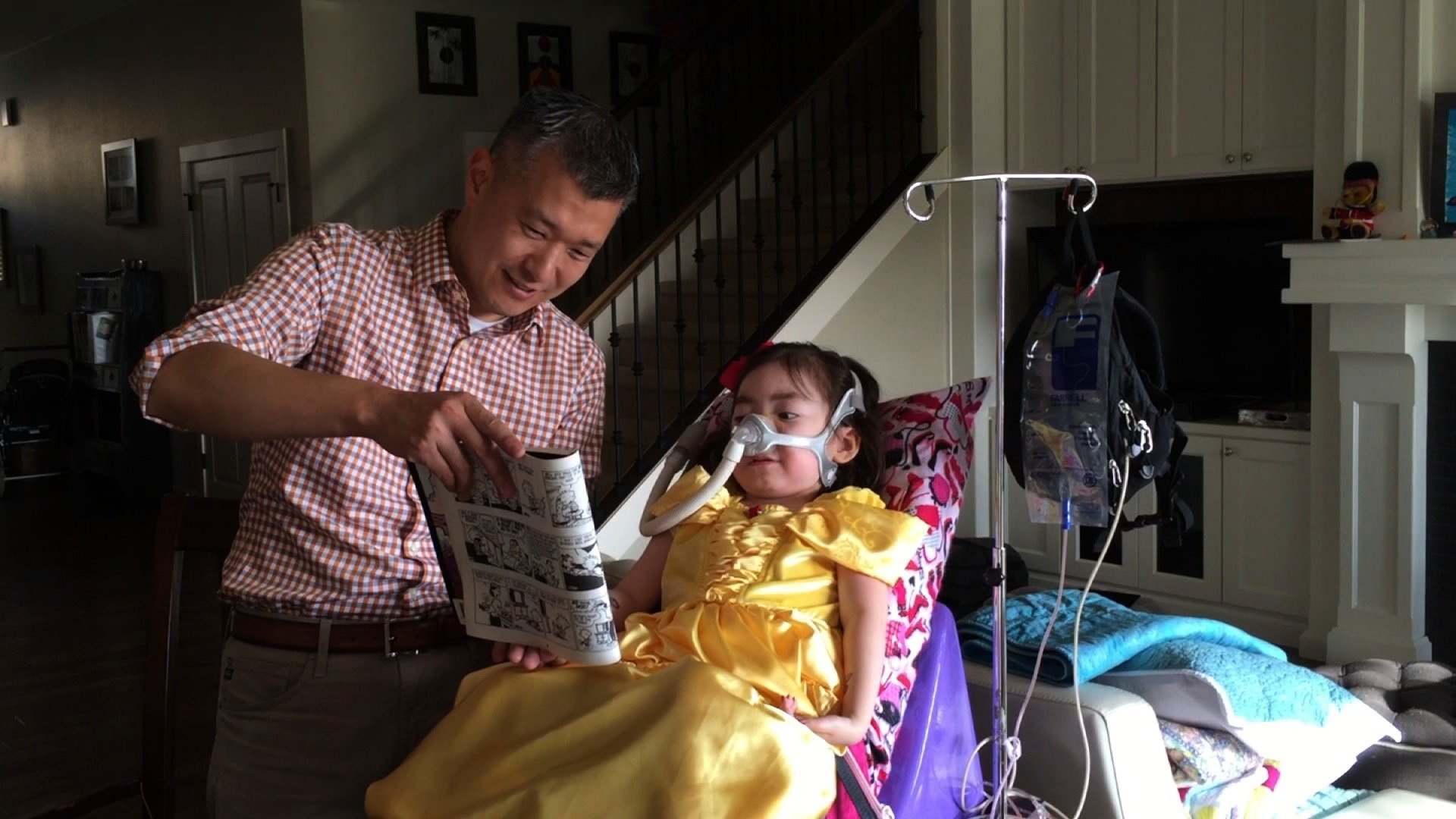Julianna Snow, the 5-year-old girl who sparked an international conversation about wrenchingly difficult decisions for terminally ill children, died Tuesday.
“Our sweet Julianna went to heaven today,” her mother, Dr. Michelle Moon, wrote on a blog devoted to her daughter. “I am stunned and heartbroken, but also thankful. I feel like the luckiest mom in the world, for God somehow entrusted me with this glorious child, and we got almost six years together.”
Julianna was born with an incurable neuromuscular disease. CNN’s story about her last year documented how Moon and her husband, Steve Snow, consulted with their daughter about whether she would want to go to the hospital if she were to have a potentially fatal complication.
The other choice was to forgo care and go to heaven. Julianna chose heaven, and her parents, in consultation with Julianna’s doctors, abided by her decision.
That decision — heaven over hospital — started a conversation about what kind of care a child with a potentially deadly disease should receive, and whether the child herself should be consulted in the decision making.
“She was a remarkable little girl,” said Art Caplan, director of the division of medical ethics at New York University School of Medicine.
“She taught me and others that even a child can become very knowledgeable about a challenging illness and can convey thoughtful and remarkable feelings about her illness and her ideas.”
Julianna’s story
When she was 2 years old, Julianna was diagnosed with Charcot-Marie-Tooth disease, a neurodegenerative illness.
By the time she was 4, she’d lost the use of her arms and legs. Her swallowing muscles were so weak, she had to be fed through a tube in her stomach. Her breathing muscles suffered too, and she was in and out of Doernbecher Children’s Hospital in Portland, Oregon.
But her mind worked perfectly.
That’s why her parents consulted Julianna, then only 4 years old, when doctors at Doernbecher told them they would have to make some very difficult medical decisions.
The doctors explained to Moon, a neurologist, and Snow, an Air Force fighter pilot, that they should consider what they wanted to do the next time an infection made it difficult for their daughter to breathe.
Did they want to bring her back to the hospital? The doctors said there was a reasonable chance Julianna would die there after being subjected to painful procedures. Even if she lived, they said, it would probably be for a short time, and she’d probably be sedated, unable to think and talk.
There was no right answer, the doctors told them.
Early last year, Moon asked Julianna what she wanted to do and wrote about the conversation on her blog.
Michelle: Julianna, if you get sick again, do you want to go to the hospital again or stay home?
Julianna: Not the hospital.
Michelle: Even if that means that you will go to heaven if you stay home?
Julianna: Yes.
Michelle: And you know that mommy and daddy won’t come with you right away? You’ll go by yourself first.
Julianna: Don’t worry. God will take care of me.
Michelle: And if you go to the hospital, it may help you get better and let you come home again and spend more time with us. I need to make sure that you understand that. Hospital may let you have more time with mommy and daddy.
Julianna: I understand.
Michelle: (crying) — I’m sorry, Julianna. I know you don’t like it when I cry. It’s just that I will miss you so much.
Julianna: That’s OK. God will take care of me. He’s in my heart.
Julianna was in hospice for the last 18 months of her life.
During that time, she loved to wear princess dresses, make up elaborate stories and games, do arts and crafts projects with hospice volunteers, and have her toenails painted.
In a text to CNN, Moon said the end was very quick.
“She got sick very suddenly and it was back to the same battle of helping her breathe,” she wrote. “This time, she didn’t bounce back — she got worse and worse and worse and was gone in just over 24 [hours].
“We had the full support of hospice and we had the things we needed to keep her comfortable. She died at home, in her princess room and in my arms. I don’t know that she would have wanted it any other way.”
Julianna’s legacy
Julianna’s story touched millions of people. After CNN’s story, People magazine wrote a multipart series about her, and the Korean Broadcasting System — Moon is Korean — traveled to her home in Washington state to do a Christmas Day documentary about her and her family.
Most readers and viewers voiced support for the family’s decision, although some people with neuromuscular disabilities disapproved and started a Facebook campaign called “Dear Julianna.”
In her blog, Moon wrote that she wants the world to remember Julianna as the “bright light” who “loved love and ‘everyone except the bad guys.’ ”
“Please do not forget her,” Moon wrote. “She lived, she was real, and she mattered.”
“Her mind was always going. She took us to a beautiful place without limits,” she added. “She encouraged us to be our most colorful and fabulous self.”
In the end, Julianna got her wish to die without medical interventions.
“She fought hard to be here, harder than I’ve seen anyone fight, with a body that was too frail for this world. She was so brave — and I hated that she had to be so brave,” Moon wrote.
“Today she is free. Our sweet Julianna is finally free.”


